Restaurants
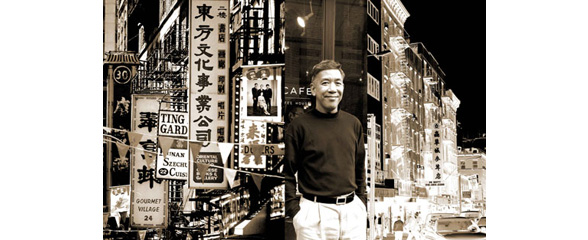
2013.022.004 Oral History Interview with Henry Chang
Henry Chang is a detective novel author and was born and raised in New York City Chinatown. In this oral history he shares a background of his family history along with when he came to Chinatown. Chang was involved in the creation of Yellow Pearl along with the civil rights movement. Chang discusses the significance Yellow Pearl has on his life along with a poem he wrote for the publication. He recounts on the ways he documented the history of Chinatown and the process of putting this history into his books. Lastly, he discusses the ways Chinatown is changing along with his favorite restaurant Grandpas.
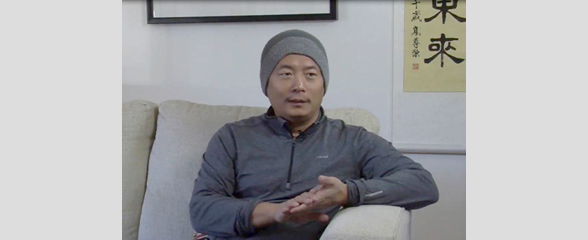
2016.037.010 Oral History Interview with Jeff Gao, 2015/11/14
Jeff Gao was born in 1976 in Shandong, China. He grew up during the end of the Cultural Revolution, thus he did not have an abundant amount of food to eat or experience. From a young age, he talks of his fondness of hand-pulled noodles and his determination to learn how to make the noodles from a chef he knew. Later, he went on to study in Beijing and eventually travel the world to learn about food internationally. His first restaurant Little Yunnan in Beijing was a huge success and the restaurant brought him success and fame in the food industry and was named one of the best restaurants in China. After the success of his initial restaurant, Gao eventually opened another restaurant in Boulder, Colorado in the United States. In his interview, Gao recounts his experience with food as he emphasizes the importance of high quality ingredients, cooking techniques, and cooking with serious passion.
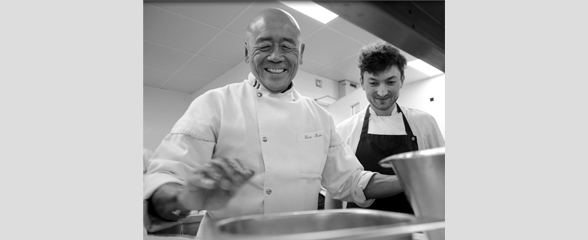
2016.037.011 Oral History Interview with Ken Hom 2015/10/29
In his interview, renowned chef Ken Hom recounts his life story from growing up in Chicagos Chinatown to his later success, including teaching at the California Culinary Academy and publishing his two successful cookbooks East Meets West and Taste of China. He expresses his passion for food and his excitement at the globalization of food culture as Chinese and Asian food gains respect and recognition abroad. He shares his views on the future of the culinary arts as well as the meaning of food on a personal level, covering topics such as fusion cooking and cooking techniques from around the world.

2016.037.012 Oral History Interview with Vivian Ku 2015/12/15
Vivian Ku, owner of the fast-casual Taiwanese restaurant Pine & Crane, talks about her journey to opening up her restaurant and the decisions she made along the way. She particularly details how her familys background and her grandmothers cooking influenced what dishes she puts on her menu and what type of restaurant she wishes to run. Her belief in the family values behind the Chinese food culture continues to drive her down the path as a restauranteur.
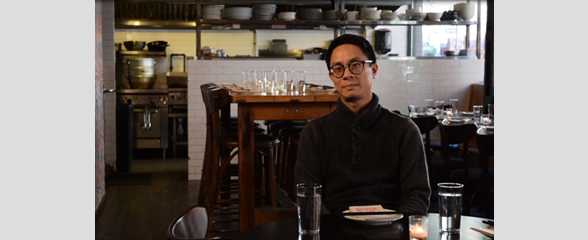
2016.037.025 Oral History Interview with Doron Wong 2015/10/30
Doron Wong grew up in Boston, Massachusetts in a traditional Cantonese family. Wong father emphasized the importance of understanding their familys cultural heritage during Wong childhood. His first experience in the restaurant world was a job at a local pizzeria when he was a teenager. During high school Wong experience working at an Asian fusion restaurant solidified his desire to pursue a career in the culinary world. Wong attended culinary school before moving to New York City and working under renowned chef David Burke. Continuing his culinary career abroad, he further refined his skills in various Hong Kong and Singapore kitchens. Wong began working with celebrity chef Susur Lee while in Singapore, developing his Chinese cooking skills and later assisting Susur Lee with his first NYC restaurant, Shang. Wong hopes his Yunnan and Cantonese cooking will help dispel stereotypes about Chinese food in America.
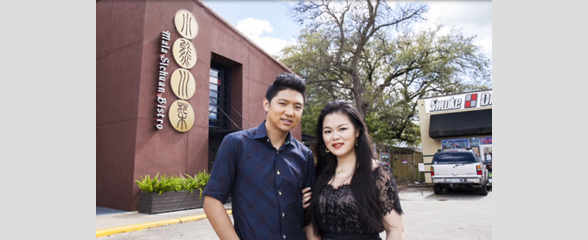
2016.037.028 Oral History Interview with Cori Xiong and Hen Chan
Cori Xiong and Hen Chan started the Mala Sichuan Bistro restaurant business in Houston, Texas. The two met while studying at University of Texas Austin. Xiong father was a food engineer in Sichuan, China and convinced Xiong to start her own family business. With the help of family, Xiong was able to bring authentic Sichuan flavors to the United States. All the chefs that work in her restaurants have studied at a culinary school in Sichuan. Xiong and Chan both believe that regional Chinese cuisine will continue to be popularized and accepted in America. They hope to see a future where Americans are more sensitive to authentic Chinese food.